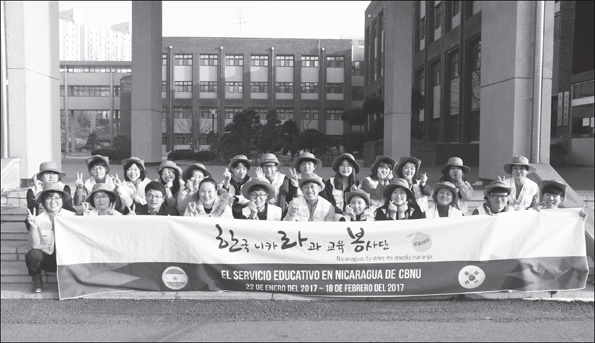
For 4 weeks, from last Jan. 22nd to Feb. 18th, CBNU’s volunteer team Hanrabong went to Nicaragua in Central America for educational volunteer work. Hanrabong, which consisted of 20 members and a leader, Han Jae-young (Professor of Dept of Chemistry Education), conducted educational activities for Nicaraguan students that comprised 10 subjects: math, physics, chemistry, biology, earth science, economy, Korean, English, culture, and IT. Let’s hear from Prof. Han Jae-young.
Can you introduce the Hanrabong team to us?
Hanrabong is an abbreviation for ‘Korea-Nicaragua education corps’, which was thought up by the students. We applied for an international educational volunteer program, which was a new government program established last year. Through this program, we were supported by the government for all costs while volunteering there for 4 weeks. This was the first educational volunteer activity conducted by CBNU. Since this was educational volunteering, the team members were restricted to students who majored in the College of Education or to graduates who majored in education.
I heard that the team used a co-teaching system. What is it?
Co-teaching is a way where both Korean students and local students attend a class. The reason why we used that way is because there was a communication problem, as Nicaragua’s local language is Spanish. Korean students prepared by studying Spanish, but it was not enough to teach successfully nor to understand the students’ questions. We selected Nicaraguan students who could speak not only Spanish but also Korean and English. In doing so, we could manage the classes. The classes were basically run using a Spanish script written by the Korean students. However, since the pronunciation and expressions were not accurate, we changed the class format: we started with some basic explanations and took some questions from the local students when they asked.
Was there any difficulty while volunteering?
The most difficult thing was that the time to prepare for the program was too tight because CBNU was selected as an additional selection. Because of this, unlike other universities which could prepare for it earlier, we started to prepare in October for volunteering that would start in January. We couldn’t do anything else because we needed to concentrate on this. There were many tasks throughout the whole process, including writing a proposal and applying for the grant. Fortunately, some institutions also supported us, so we were well equipped until we left. Nicaragua’s contact system was also a problem. Their system only allowed contact to a local school through an embassy or the government, so direct contact was difficult. Due to our late arrival to the program, we were even asked to change the date of our arrival. The slow progress was hard to handle.
Recently, many global volunteer activities have formed and many students have showed interest in those activities. What do you think about this?
I think it is a good movement. In the past, global volunteer teams usually visited Korea to help us, but we are now the ones helping. Dispatching Korean volunteer teams abroad is a brand new feat for Korea. In fact, Korea is the only country to change from a beneficiary to a benefactor. Therefore, with the appreciation of the kindness we received before, our global volunteer efforts will grow. For the educational volunteer work, a variety of people have applied for it, such as students, teachers and other vocational people. I think this is the proper direction for Korea.
Please give some advice to students who are preparing for global volunteer work.
The most important thing is preparing for the native language. This surely can be an advantage. The possibilities become wider if you know the local language. By utilizing your language ability and major, you will be able to benefit from many opportunities. Also, when you do global volunteer work, since it is not just a qualification but for personal growth, you have to be well-prepared. Finally, keep in mind that you need to respect the local people. We are helping them not because they are poor or pitiful. We have to treat them equally and interact with them to create global citizenship.
By Yoo Jin-kyu
jk37@cbnu.ac.kr


 All
All Campus News
Campus News






 Yoo Jin-kyu
Yoo Jin-kyu











